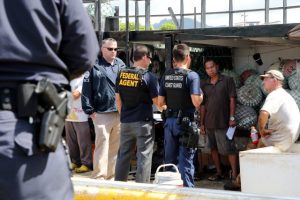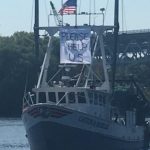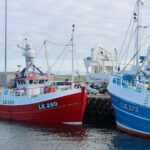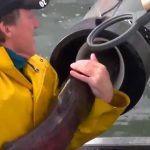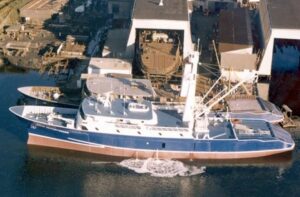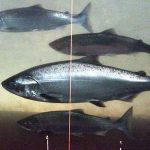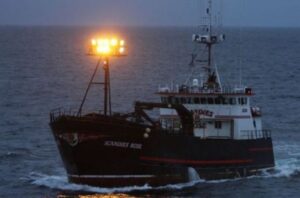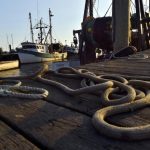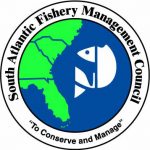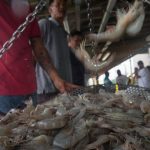Tag Archives: Hawaii’s longline fleet
Hawaii’s longline fleet hits Bigeye tuna quota early
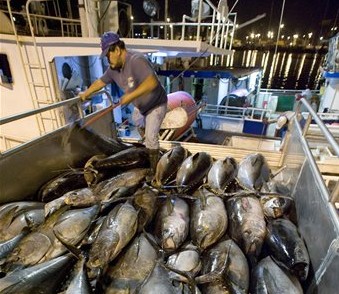 The longline fleet, nearly all of which is based in Honolulu, will now have to travel farther to fish for bigeye, a factor that could lead to better prices for Big Island fisherman bringing in tuna with handlines. Fishing quotas are set years in advance by the Western Pacific Fisheries Commission, an international group of 27 countries. They are based on historical levels of catch “and then reduced quite a bit,” said Eric Kingma, international fisheries enforcement coordinator for the Western Pacific Fisheries Management Council. Hawaii’s longline fleet makes up about 3 percent of the worldwide bigeye catch. It’s not clear why this year’s quota of 3,554 metric tons was reached so early. Last year, the fishery closed in August, the earliest the region had ever been restricted. “It’s the same number of hooks (in the water),” said Hawaii Longline Association president Sean Martin. Catch rates are 40 percent higher than historical numbers, he said. Read the rest here 14:16
The longline fleet, nearly all of which is based in Honolulu, will now have to travel farther to fish for bigeye, a factor that could lead to better prices for Big Island fisherman bringing in tuna with handlines. Fishing quotas are set years in advance by the Western Pacific Fisheries Commission, an international group of 27 countries. They are based on historical levels of catch “and then reduced quite a bit,” said Eric Kingma, international fisheries enforcement coordinator for the Western Pacific Fisheries Management Council. Hawaii’s longline fleet makes up about 3 percent of the worldwide bigeye catch. It’s not clear why this year’s quota of 3,554 metric tons was reached so early. Last year, the fishery closed in August, the earliest the region had ever been restricted. “It’s the same number of hooks (in the water),” said Hawaii Longline Association president Sean Martin. Catch rates are 40 percent higher than historical numbers, he said. Read the rest here 14:16
Hawaii’s longline fleet about to hit its 3,554-ton bigeye tuna limit, enviro scorned rule will keep them fishing
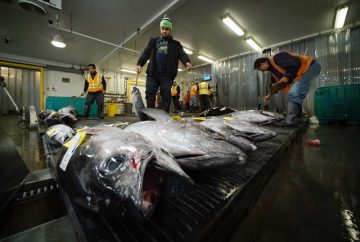 Hawaii’s longline fleet is about to hit its 3,554-ton limit for bigeye tuna in the Western and Central Pacific, prompting a closure date for the fishery of July 22, according to the National Oceanic and Atmospheric Administration. The longliners had caught an estimated 98 percent of their annual quota by Wednesday, National Marine Fisheries Service reported. The feds had been predicting longliners would hit their bigeye tuna limit by Aug. 14. But the closure will likely be short-lived thanks to a federal rule that proposes, like in years past, allowing U.S. Pacific Island territories — American Samoa, Guam and the Commonwealth of the Northern Mariana Islands — to each allocate up to 1,000 tons of their 2,000-ton quotas to U.S. longliners under a “specified fishing agreement.” David Henkin, staff attorney for Earthjustice, a nonprofit environmental law organization, calls it a “shell game” that allows overfishing, but the courts have so far disagreed. Read the rest here 10:23
Hawaii’s longline fleet is about to hit its 3,554-ton limit for bigeye tuna in the Western and Central Pacific, prompting a closure date for the fishery of July 22, according to the National Oceanic and Atmospheric Administration. The longliners had caught an estimated 98 percent of their annual quota by Wednesday, National Marine Fisheries Service reported. The feds had been predicting longliners would hit their bigeye tuna limit by Aug. 14. But the closure will likely be short-lived thanks to a federal rule that proposes, like in years past, allowing U.S. Pacific Island territories — American Samoa, Guam and the Commonwealth of the Northern Mariana Islands — to each allocate up to 1,000 tons of their 2,000-ton quotas to U.S. longliners under a “specified fishing agreement.” David Henkin, staff attorney for Earthjustice, a nonprofit environmental law organization, calls it a “shell game” that allows overfishing, but the courts have so far disagreed. Read the rest here 10:23



































